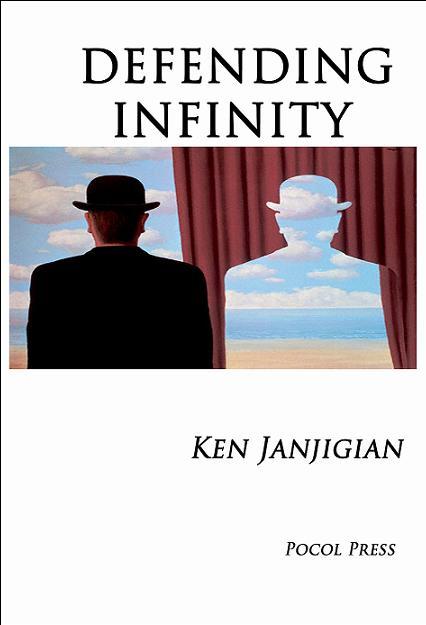|
|
| Detailed Book Review |
| |
| |
| |

|
|
| Defending Infinity |
| By Ken Janjigian |
| ISBN: 978-1-929763-34-4
|
| Price: $17.95 |
| Shipping: $4.00 |
| |
|
|
|
Defending Infinity is a tragicomic novel vividly written in crackling prose. It is the story of
Van
Arakalian, who has been playing it safe for many years. He has a proper job, a loving fiancée and
suburbia is
calling. However, soon after his father’s death, his life veers towards cataclysm. He quits his job and
returns to bartending where he befriends an eccentric and seductive group of artists. Meanwhile, Van is
dealing with insomnia. During sleepless hours he obsessively keeps a surreal and spontaneously written
journal, which he refuses to read. Van’s fiancée finally demands that he examine the real issues
catalyzing
his erratic behavior, but Van is suddenly more focused on starting a new life of travel and creativity.
Defending Infinity is also available as an ebook on Amazon.com for the Kindle.
Ken Janjigian is also the author of Trapped Doors (Pocol Press, 2005), a collection of novellas
set in
San Francisco. Mr. Janjigian was honored to be a guest speaker/reader at the Jack Kerouac: Writers of
the
Next Generation event in 2007.
|
| |
| Book Review Details: |
| |
| Reviewed Appeared In: Cambridge Chronicle |
| Reviewed By: Matt Dunning |
Text Of Review: Art and insomnia drive new novel set in Cambridge
CAMBRIDGE - Van Arakalian is at a crossroads.
He’s about to turn 30, about to get married and feels as though, any minute now, he’ll begin choking on the banality of his own impending adulthood.
Van is the central figure in Watertown author Ken Janjigian’s new novel, “Defending Infinity,” the story of a young Cambridge man struggling to reconcile the pressure to lead a “normal” life and his desire to live la vie boheme. Set against a backdrop that includes Harvard and Central squares — as well as Boston and Paris — Janjigian’s book follows Van as he is charmed by a cast of motley artists and barstool prophets, who spend their energy imploring him to let loose his creative urges.
During a recent interview with the Chronicle, Janjigan, 41, said Cambridge — with its reputation for breeding artists, writers and other assorted creative types — made the perfect setting for Van’s story.
“The characters are very eccentric; they’re artists or characters that want to be artists,” Janjigian said, adding that he spent almost every weekend he could as a teenager in Belmont traipsing around Harvard Square. “So you have that element that Cambridge has, especially in the Harvard Square and Central Square, that eccentricity and bohemian mentality. A lot of people say it’s gone from Harvard Square, but I think it’s still there, or at least, its memory is still there.”
As the novel opens, Van finds himself at wit’s end with his dull and stifling job in low finance. He hasn’t been able to sleep in months, and has been keeping a journal of his slumber-deprived stream of consciousness. He abruptly quits the cubicle life and goes back to his old trade as a bartender in Harvard Square. Manning the bar, he encounters a small band of artists and writers who implore him to join them in their pursuit of artistic revolution. At the same time, his would-be wife is beginning to worry about his increasingly erratic behavior.
“Just when it’s time for them to get practical, he’s getting impractical,” said Janjigian, a Clark University grad. “He’s trying to convince her to go to Europe with him and pursue this artist lifestyle, and she’s kind of over it.”
Early in the book, two of Janjigian’s bohemian troubadours — the verbose, bloated patriarch Bishop Rourke and his fiery protégé, Derek Koles — argue over the perceived implication of writing a narrative in the first person. Discussing the latter’s forthcoming manuscript, Bishop insists that writing in the first person is the only way to “cut into the skin of the truth,” while Koles worries that use of the first person will lead readers to believe the work is autobiographical, something he’s desperate to avoid. Considering their exchange, one wonders exactly how much of “Defending Infinity,” which is written in the first person, is Janjigian’s autobiography.
“There’s definitely some elements of personal experience, but they’ve all been evolved through the process of writing fiction into various contortions,” said Janjigian, who teaches English and writing at both the Harvard Extension School and Northeastern University. “I’ve never had that cubicle experience, but everyone goes through something like it in life, I think.”
Janjigian said “Defending Infinity” should be in bookstores by the end of March.
|
| Date Reviewed: 2/27/2008 |
| Link To Web Site:
|
| Author Appearances: |
| Contact Author:
Email Author |
|
|
|







